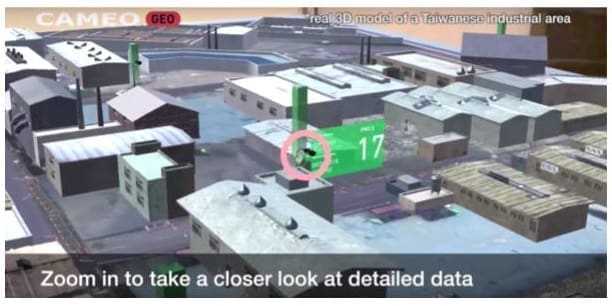- Taiwanese companies have developed a platform that allows cities to fight against air pollution.
- Thanks to the use of Big Data Analytics and AI algorithms, the platform makes it possible to identify sources of air pollution in real-time for law enforcements to act upon.
- The AI Pollution Emergency Platform assists local governments in the implementation of fully automatic air quality detection systems for industrial areas.
- Thanks to artificial intelligence, the system can predict environmental emergency episodes with 70% accuracy and help governments make timely decisions.
Taiwan, November 2020.- During the GSMA Thrive Asia Pacific online event, the Industrial Development Bureau (IDB) will show the solutions for smart cities developed by Taiwanese companies.
Through its 3D immersive online platform “Smart City Taiwan 360, IDB will showcase Taiwan’s leadership and technological capabilities from November 3 until early next year: www.smartcitytw360.com
The novelties that are being presented fall into categories including Mobility, Governance, Health, 5G and more. Among the solutions that stand out the most in terms of Governance, is the technology developed by Taiwanese companies to fight against air pollution.
The World Health Organization (WHO) estimates that 7 million deaths occur each year in the world due to air pollution. Besides, this type of contamination plays an important role in the development of diseases such as acute respiratory infections and chronic obstructive lung diseases.
To respond to this problem, the AI Air Pollution Emergency Platform for City Governance was born, an Atmospheric Pollution Emergency Platform with artificial intelligence for local governments and law enforcements.
The AI Air Pollution Emergency Platform is built with air pollution sensors that automatically detect environmental conditions such as temperature, humidity, and toxic substances including PM2.5, CO, O3, and NO2 at five-second intervals. By synchronizing with national monitoring station data such as time, wind speed and direction, the system can analyze and provide accurate estimates, early warnings, and locate the source of contamination. Thanks to the visualization of the data, the platform helps air pollution’s government management in industrial areas or large cities.
Data integration
The system makes it possible to identify effectively and in real-time the areas where the sources of contamination are and to mitigate them. All thanks to the integration of IoT sensors, national monitoring stations and private IoT sensors.
Smart learning module to predict environmental emergencies
The artificial intelligence algorithm is used to establish an automatic predictive air quality system, which makes predictions about what the air quality will be like in four hours. Its predictions are 70% accurate thanks to an intelligent model that takes into account the environmental factors of the analyzed areas such as time, space, seasonal wind speed, direction, and so on.
Research integration
In Taiwanese cities, the system manages, once with the evidence collected on the site and the pictures uploaded to the database, to detect illegal emissions from industrial factories in an agile way. In turn, it makes it possible for local governments to have adequate information to make decisions. For example, currently, only 10% of reported cases have inspectors reaching the source of contamination in at least 30 minutes. With this system, it is possible to monitor large areas in real-time.


About Industrial Development Bureau (IDB)
Industrial Development Bureau (IDB) is the administrative agency of Ministry of Economic Affairs, Taiwan. IDB serves the role to formulate industrial policies, and to oversee various industries including metal & mechanical, information technology, consumer goods & chemical, knowledge services, as well as sustainable development in Taiwan. Particularly, IDB is the governing agency for the Smart City Taiwan initiative. The initiative aims at utilizing all types of smart technologies (such as IoT, Big Data and AI) to effectively integrate local, industry, and civilian needs. With support from the central government, collaboration and integration between local governments and industry stakeholders have resulted in many fruitful accomplishments. IDB has also been strongly supportive for Taiwan’s vendors to demonstrate the capabilities of Taiwan ICT supply chain in the global marketplace.

